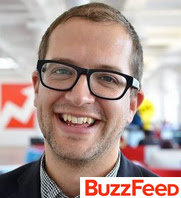|
|
Dear Colleagues:
Journalists face numerous and often unexpected roadblocks to deliver timely, useful, and meaningful information to the public.
For this issue of Marketing Coach we have additional commentary and stories with Scott Lamb, VP of International at BuzzFeed, and Delphine Halgand, USA Director of Reporters Without Borders. They identify fascinating -- and very concerning -- safety issues surrounding the ablity for journalists to do their jobs, and share stories about how journalists face obstacles to freedom of speech, and getting news to us - regardless of what is happening on the ground.
In this issue we share stories about coverage about Charlie Hebdo in Paris to Mexico and China to Syria and Ukraine.
Enjoy!
|
|
|
|
|
|
|
|
|
 |

|
 |
|
Ivy Cohen: How are country policies to limit or prohibit free speech playing out?

Delphine Halgand |
In the last Reporters Without Borders' (RWB) index of press freedom around the world, we observed a decline of press freedom overall worldwide. This affects all continents from Europe to the Middle East. It is very concerning. As conflicts on the ground proliferate, there is an information war. We've witnessed it time and time again. More governments are using blasphemy laws to censor civil society and journalists. In Saudi Arab and Iran, the government is claiming that journalists are insulting Islam.
Mexico has been one of the deadliest countries in the Western Hemisphere. Since 2000, 90 journalists have been killed in Mexico. In most cases, there is no one in jail for these murders, so impunity is given -- and a blind eye is turned. These reporters are targeted for investigating drug cartels and political corruption.
Media is not covering journalist kidnappings in the U.S. the same way as in the Europe. In Europe we are witnessing a mobilization of journalists defending their colleagues that we don't see in the U.S. However, we are starting to see U.S. media become more involved in these issues. RWB organized a campaign for American journalist Austin Tice. We mobilized more than 270 media outlets to become involved advocating to raise awareness about their missing colleague and encourage government action.
|
|
 |
|
Ivy: How is news getting out of China?

Delphine Halgand |
It is so difficult for news to circulate inside China. It's even harder for it to get out of China. The Chinese government has installed "the Great Firewall." Google, Facebook and Twitter are blocked. Accessing the free internet is almost impossible for the Chinese people. People need to access a VPN (Virtual Private Networks) to access the regular internet.
This affects the world's and the U.S.' ability to learn what is happening in a country that is so linked to our economic interests.
|
|
 |
|
Ivy: What were the implications for journalists with the Charlie Hebdo murders?

Delphine Halgand |
I was in Paris that day. We have only seen a few similar attacks against journalists in the past, but in countries like Somalia and Pakistan - some of the deadliest countries for journalists.
It was shocking. We called for solidarity to show that Charlie Hebdo was a symbol of press freedom -- an incarnation of our democratic values. Charlie Hebdo was not dedicated to mock Islam; it is a satirical newspaper that had (30 front pages dedicated to religion over 10 years - 8 of which were dedicated to Islam). The paper mocked, discussed and satirized everyone and every religion. They were not singling out one specific group.
In the aftermath of the attack, we saw a huge movement of solidarity to defend the work of Charlie Hedbo. We need to use that energy and solidarity to help all other news media and journalists, who are defending our everyday freedoms. There are a lot of other "Charlies" in our world, and their rights of expression deserve protection.
|
|
 |
|
Ivy: How was BuzzFeed able to cover ISIS oil smuggling from Syria to Turkey?

Scott Lamb |
We don't have any reporters operating from Syria. We were able to get an exclusive story because we had reporters living in Istanbul. Reporting from the border is a good way to cover a story that is both dangerous and complicated as the situation in Syria is. Our reporter in Istanbul was able to get a hold of a story about how ISIS was financing the war by illegally smuggling oil over the border.
This story boiled down to good old-fashioned journalism. Having lived in the Middle East for a long time, our reporter had a source who knew about this illicit oil trade. We were the only ones to run this story. The follow up on the story was that the Turkish Army conducted raids to stop the flow of oil out of Syria. This is the direct impact that you hope to have with journalism.
|
|
 |
Ivy: What was your breakthrough story on Ukraine?

Scott Lamb |
A BuzzFeed reporter based in Kiev was living in the region for a while. He was assigned to cover the fighting at the border of Russia and Ukraine. There was a lack of clarity about who was involved in the border skirmishes going on in Ukraine, and the Russian government was adamant that these were Ukrainian separatists who were crossing the border.
Looking at Instagram posts from Russian soldiers, a BuzzFeed reporter on the ground got a tip from someone in Ukraine steering him to the soldier and we were able to verify he was a Russian soldier. It was that solider who was posting images from inside Ukraine.
|
|
 |
Marketing Coach is a publication of Ivy Cohen Corporate Communications, Inc.
ICCC helps companies build brands and differentiate in a competitive market
through public relations, strategic communications and content marketing.
To find out how ICCC can help you and your company build your reputation
Join our Mailing List I Twitter I Visit Our Website I Printable Version
|
|
|
|
|
|
|
|